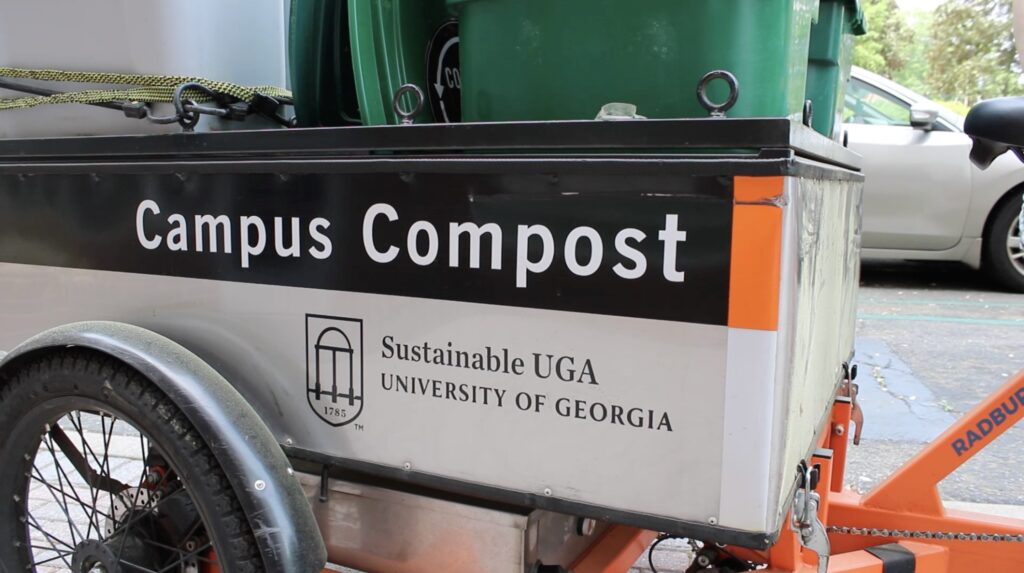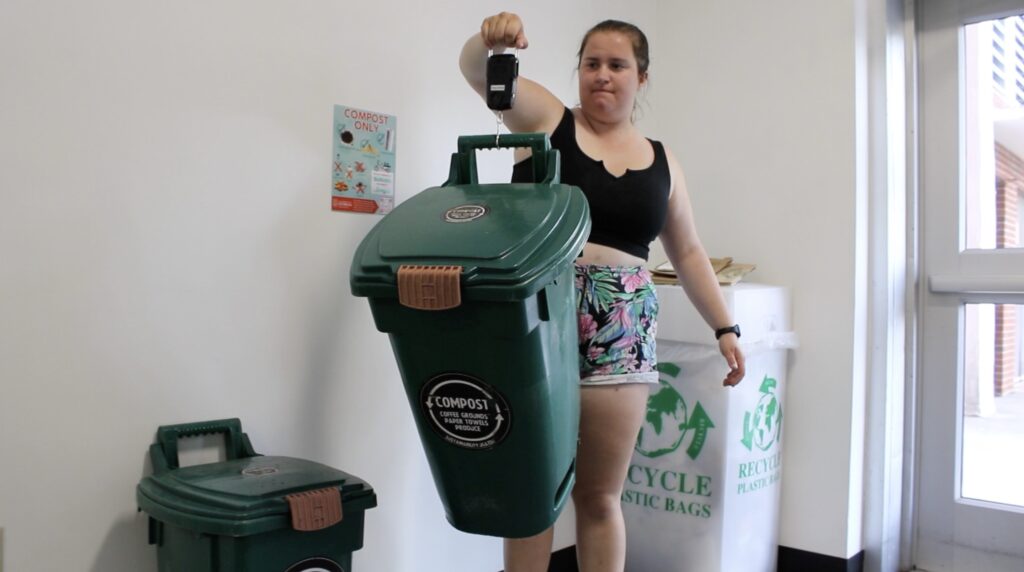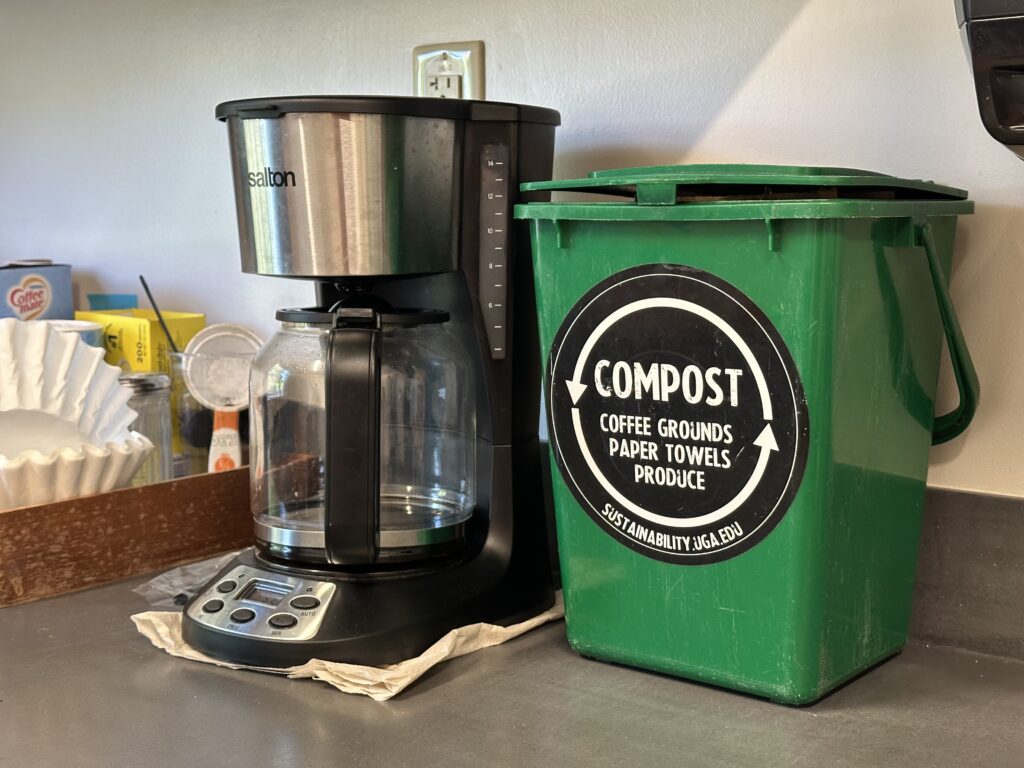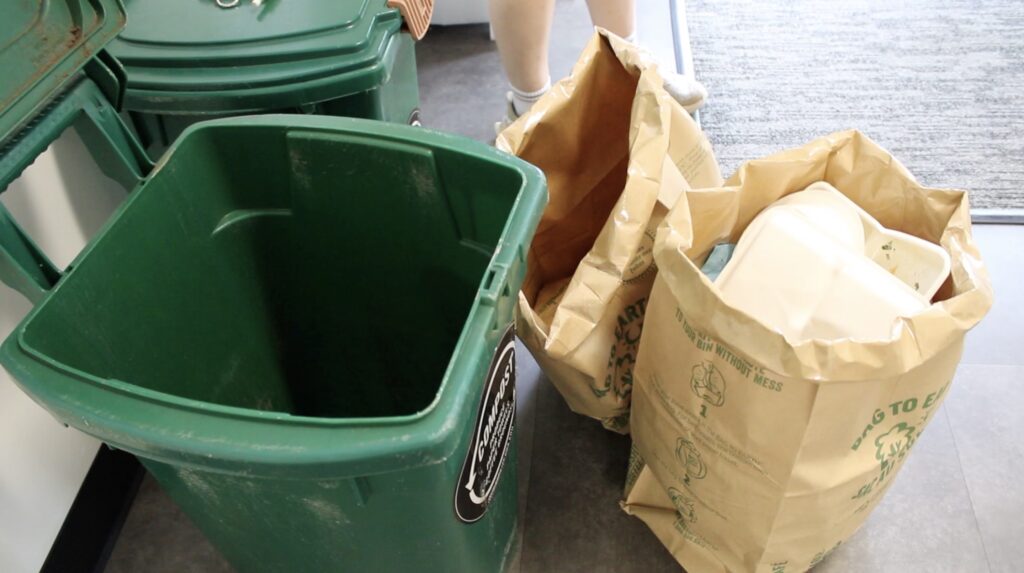Among the hustle and bustle of the University of Georgia, a bright orange tricycle transports dark green compost containers throughout campus.
Emme McCumiskey, an intern at the UGA Campus Compost Program, arrives at various offices and residence halls on her electric-powered trike. Walking in empty-handed, she often leaves these buildings carrying heaping bags of food scraps, coffee grounds and paper towels. This compost will be sent to Athens-Clarke County Landfill, but it will not be left to decompose.
Instead, it will be given a new purpose, transformed into fertilizer to be used by local communities.
Growing up composting with her father, McCumiskey came to UGA to motivate others to incorporate composting into their lifestyles.
“I knew I really wanted to inspire other students to also compost,” said McCumiskey. “One of my main goals is to bring awareness to compost around campus.”
The UGA Campus Compost Program is one example of the rising efforts to support waste reduction practices in Athens-Clarke County. These efforts are becoming increasingly crucial as concerns grow over landfills filling up too quickly due to high volumes of waste being produced.
In 2018, about 146.1 million tons of waste were landfilled in the U.S. Addressing organic waste, such as the 24% of landfilled food waste, has become the UGA Campus Compost Program’s target to reduce waste and greenhouse gas emissions caused by landfills.

Electric-Powered and Community-Driven
Founded in 2014 through the Sustainability Grant, the UGA Campus Compost Program started with volunteers picking up compost through trucks and vans. In 2019, they obtained two electric-powered Radburro tricycles, which have become their main mode of transportation to collect waste.
The program relies on interns driving the same weekly route to collect, record, and drop off compost. McCumiskey said becoming a familiar face to buildings on her route has been a rewarding part of her job.
“It’s really nice when the front desk people recognize me or people smile at me on the street. That’s been really fun,” she said.
As of the spring semester of 2023, the program serves 70 different locations on campus with a total of 117 compost bin sites. In two semesters, the UGA Campus Compost Program managed to keep 9,400 pounds of organic waste out of the landfills and back into the hands of community members repurposed as fertilizer.
How it Works
Interns such as McCumiskey collect bags filled with the week’s compost collection from each of their assigned locations. Using compostable bags to collect the waste, she changes out the bags and weighs each one to be recorded in her notebook. After weighing, she loads the bags onto the trike to be dropped off at the Chicopee compost shed.

Service workers collect the compost at the Athens-Clarke County Landfill where it will get processed and mixed with carbon material to make fertilizer. After 45-60 days, the compost appears similar to brown soil. After a final screening for irregular items, the compost is distributed to campus organizations such as UGArden, UGA Landscaping and other members of the local community.
Small Effort, Big Impact
The thousands of pounds of waste that the program is able to divert from the landfill all starts with community effort. The UGA Campus Compost Program relies on the engagement of the staff, faculty and students of UGA to learn which types of waste are compostable, and to dispose of their waste accordingly.
Sydney Hilliard, a customer service specialist at the University Housing Assignments Office, takes advantage of the compost bins by disposing her food scraps from lunch.
Alex Ferraro, fiscal affairs manager at the University Housing Business Office, uses the compost bins to throw away used paper towels. He thinks the bins help to promote sustainable choices within the office.
“I think it benefits really everyone in the office because it sets a good precedent to set good habits,” he said. “If you’re willing to do this right here at work, then you might be willing to do it at home.”

McCumiskey pointed out a noticeable increase in the compost bins being utilized, and it keeps her hopeful that the program’s work is making a significant community impact.
“People do want to compost and people do care about this kind of stuff, they just might not know how at first,” she said.
The Drawbacks
Since composting relies on community efforts, this can come with a few setbacks. The UGA Campus Compost Program offers infographics at location sites showing what kind of waste is compostable, but McCumiskey notices items being thrown in the compost bins that are falsely advertised as compostable.
Items go through a certification process set by the Biodegradable Products Institute to be properly labeled as compostable. If a product is falsely labeled, consumers can be misled into disposing non-compostable items into compost bins.
“‘Compostable’ has no meaning,” she said. “It sucks because a person is trying to do the right thing by buying a compostable product, but it’s not actually compostable,” she said.

Power in Repurposing
Even with its drawbacks, composting has become a significant strategy in battling rising landfills and the environmental consequences that come with it. Programs such as the UGA Campus Compost Program highlight an important key to sustainable solutions: There is power in knowledge and community effort. One food scrap, coffee ground or paper towel leads to thousands of pounds being redirected from landfills, leading one step closer to a safer, cleaner and sustainable future for all communities.
“I use the compost bin because it makes me feel like I’m making a difference, even if it’s a small one,” said Hilliard.
Shannon Leftwich is a senior majoring in journalism at the University of Georgia.








Show Comments (1)